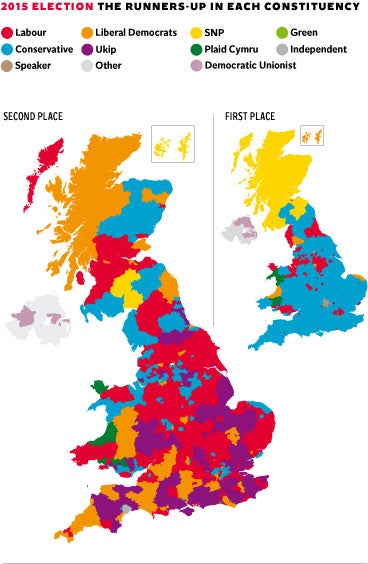Labour figures admit underestimating Ukip threat cost them seats in the general election
Analysis reveals how many votes Ukip picked up in Tory-won constituencies

Labour figures have admitted they underestimated the threat from Ukip, after it emerged that Nigel Farage’s party may have deprived Labour of victory in many seats in last week’s election.
Analysis of the results by The Independent shows that Ukip won more votes than the size of the Conservative majority in nine seats the Tories gained from Labour. They included Morley and Outwood, where the former shadow Chancellor Ed Balls suffered a shock defeat by 442 votes after the third-placed Ukip candidate won 7,951 votes. Although not all of these Ukip voters would have switched from Labour, defections from Labour could have tipped the balance in the Tories’ favour.
The pattern was repeated as the Tories gained Labour-held Bolton West, Corby, Derby North, Gower, Plymouth Moor View, Southampton Itchen, Telford and Vale of Clwyd. In 48 seats retained by the Tories, their majority over Labour was lower than the number of votes won by Ukip.
Ukip was disappointed to win only one seat – Clacton – but it has taken heart from achieving second place in 120 seats. Before the election, Mr Farage made clear that a key aim was to emerge as the challenger to Labour in its northern heartlands in 2020.
In recent years, Labour has been divided over how seriously to take the Ukip threat.
Initially, Ed Miliband’s team judged that the anti-EU party would inflict more damage on the Conservatives and did not tackle it directly.
But after warnings of complacency by some Labour MPs, the party toughened its stance and produced anti-Ukip campaign material in seats where Ukip was likely to appeal to Labour’s traditional working-class voters.

Labour officials admit the Tories’ repeated warnings that a minority Labour government would be propped up by the Scottish National Party persuaded many Tory defectors to Ukip to “return home”, while Labour switchers stuck with Mr Farage’s party.
“Ukip damaged us much more than we expected,” one senior Labour source admitted. “People who didn’t want a Labour-SNP government voted in a Tory one, even though they were not enthusiastic about the prospect.”
It now appears that Labour was wrong to reject claims, published last year in the book Revolt on the Right, that Ukip had a strong appeal to working class people who felt “left behind” by globalisation.
Robert Ford, the book’s co-author and senior lecturer in politics at Manchester University, calculated that in Labour-held seats where Ukip advanced strongly last Thursday, the Labour vote dropped by four percentage points.
In Tory-held constituencies where Ukip did well, the Tory vote fell by only two points.
Mr Ford said: “It is not just a case of Ukip taking Labour votes in places like Hartlepool and Dagenham. It also has the capacity to take from Labour the votes of working-class, totally anti-Tory people who consider Ukip an acceptable option.
“They see Ukip as a vote for English nationalism and sticking one up to the Establishment. It is not just that Ukip can directly take Labour votes, but that it can fuse them with Conservative votes to generate a threat where it would not otherwise exist.”
Matthew Goodwin, the book’s co-author and associate professor of politics at Nottingham University, said that of the 50 seats in which Ukip saw the biggest rise in its vote last week, 32 were held by Labour, 17 the Tories and one by the Liberal Democrats.
He said Labour could not blame its defeat on the SNP advance. “It is also about an English nationalism that deserted Labour at the prospect of a Labour-SNP alliance,” he said.
Professor Goodwin said Blairites were wrong to blame Labour’s defeat on Mr Miliband’s failure to appeal to aspirational middle-class voters, since many working-class supporters deserted Labour after the 2001 election.
Join our commenting forum
Join thought-provoking conversations, follow other Independent readers and see their replies
Comments
Bookmark popover
Removed from bookmarks